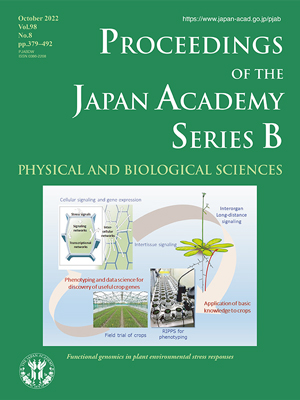About the Cover
Vol. 98 No. 8 (2022)
The global food shortage is recognized as an urgent crisis associated with rapid growth in the human population. From a viewpoint of agriculture, a major solution is modification of crops that give good yields in unfavorable conditions, such as dry fields. Key resources to improve crops can be obtained from basic biological research on how plants sense and respond to environmental stresses.
The review article in the current issue (pp. 470-492) presents the research cycle from bench-work to application in the field made by Dr. Kazuo Shinozaki, Dr. Kazuko Yamaguchi-Shinozaki, and colleagues. Using the model plant Arabidopsis thaliana, they started by finding genes involved in responses and resistance acquisition to environmental stresses, such as drought and low temperature. Systematic analysis of newly made transcripts in plants in drought stress conditions showed thousands of genes are induced. They encoded a number of transcription factors in addition to functional proteins including protein kinases, enzymes involved in the biosynthesis of the plant hormone abscisic acid (ABA), and proteins that protect cells from dehydration. Further molecular and systematic analyses revealed that the cellular responses are composed of two major signal transduction systems: an ABA-dependent and an ABA-independent system. The authors identified that transcription factors ACGT-containing ABA response element (ABRE)-binding protein/ABRE-binding factor (AREB/ABF) and dehydration-responsive element-binding (DREB) protein are key players in the ABA-dependent and ABA-independent systems, respectively (top-left panel of the cover page).
It is known that a typical action of plants is closure of guard cells in leaves when water shortage is sensed in roots. Inter-organ and inter-tissue signal transduction systems are also important in stress response in plants. It was shown that transport of ABA and a small peptide named CLE25 support the long-distance inter-organ signaling (top-right panel).
Basic knowledge on stress responses, particularly the identification of key genes, made it possible for the authors to move to the next stage of research, namely the molecular breeding of crops. The process consisted of two steps. First, to confirm whether the modification of key genes works as expected in stressed conditions, quantitative as well as qualitative measurements of the phenotype are required. For this purpose, the authors developed a large-scale, high-throughput, nondestructive, real-time assay system called RIPPS. Second, when the phenotyping showed successful results in model plants, similar modifications were introduced into crops using genetically modified organism technology. The authors have started an international collaboration testing the growth and yield of crops with modified functions of key genes, including AREB, DREB, and galactinol synthase (GolS), in the field in drought condition. Positive results were obtained showing the crops acquired drought tolerance as expected (bottom panel).
The research cycle proposed by the authors will be highly important to escape from the global food shortage in the coming years.
Prof. Kiyotaka Okada
Ryukoku Extension Center, Ryukoku University
Emeritus Professor of Kyoto University, of National Institute for Basic Biology




